VANCOUVER, British Columbia, Jan. 30, 2024 (GLOBE NEWSWIRE) — Li-FT Power Ltd. (“LIFT” or the “Company”) (TSXV: LIFT) (OTCQX: LIFFF) (Frankfurt: WS0) is pleased to report assays from 8 drill holes completed at the BIG West, Nite & Ki pegmatites within the Yellowknife Lithium Project (“YLP”) located outside the city of Yellowknife, Northwest Territories (Figure 1). Drilling intersected significant intervals of spodumene mineralization, with the following highlights:
Highlights:
- YLP-0165: 23 m at 1.25% Li2O, (Ki)
- YLP-0150: 13 m at 1.27% Li2O, (BIG West)
- YLP-0166: 9.5 m at 1.36% Li2O, (BIG West)
- YLP-0157: 9 m at 1.10% Li2O, (Nite)
and: 1 m at 1.13% Li2O
and: 2 m at 0.85% Li2O - YLP-0158: 9 m at 1.02% Li2O, (BIG West)
and: 7 m at 1.09% Li2O
Discussion of Results
This week’s drill results are for eight holes drilled on three separate pegmatite complexes, including BIG West, Nite and Ki. A table of composite calculations, general comments related to this discussion, and a table of collar headers are provided towards the end of this section.
Francis MacDonald, CEO of LIFT comments, “This week we have released an excellent result from the Ki pegmatite. Hole YLP-0165 is one of the better holes to date in terms of grade x thickness. The Ki pegmatite will be one of the focuses for the winter drill program and we plan to systematically step out from current drilling along untested spodumene-bearing outcrops to the northwest of drilling completed to date.”
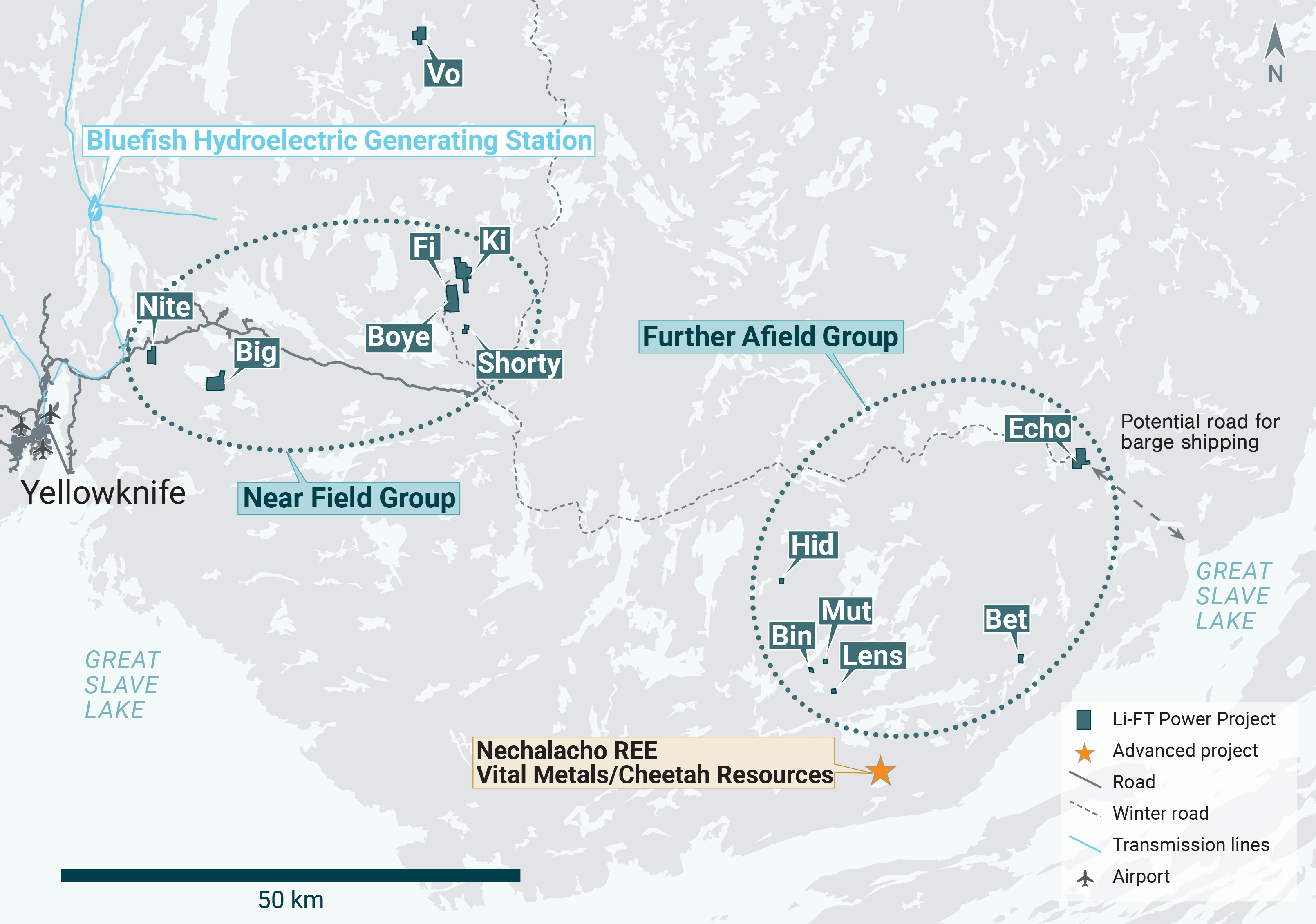
Figure 1 – Location of LIFT’s Yellowknife Lithium Project. Drilling has been thus far focused on the Road Access Group of pegmatites which are located to the east of the city of Yellowknife along a government-maintained paved highway, as well as the Echo target in the Further Afield Group.
Ki Pegmatite
The Ki pegmatite is one of several subparallel dykes occurring within a north-of-northwest trending corridor. Drill intercepts typically comprise a thick “main” dyke flanked by one or more narrower (1-5 m wide) dykes although, in places, it is formed by 2-6 dykes of similar cumulative thickness spread over up to 80 m of core length. The Ki dyke is visible for at least 1.0 km on surface and dips between 65°-80° to the southwest.
YLP-0165 tested the Ki pegmatite approximately 200 m from its southern mapped extent and 50 m vertically beneath the surface, as well as 50 m down-dip of YLP-0118 (0.96% Li2O over 1 m). Drilling intersected a 23 m wide pegmatite dyke that returned 1.25% Li2O over 23 m (Table 1 & 2, Figures 2 & 3).
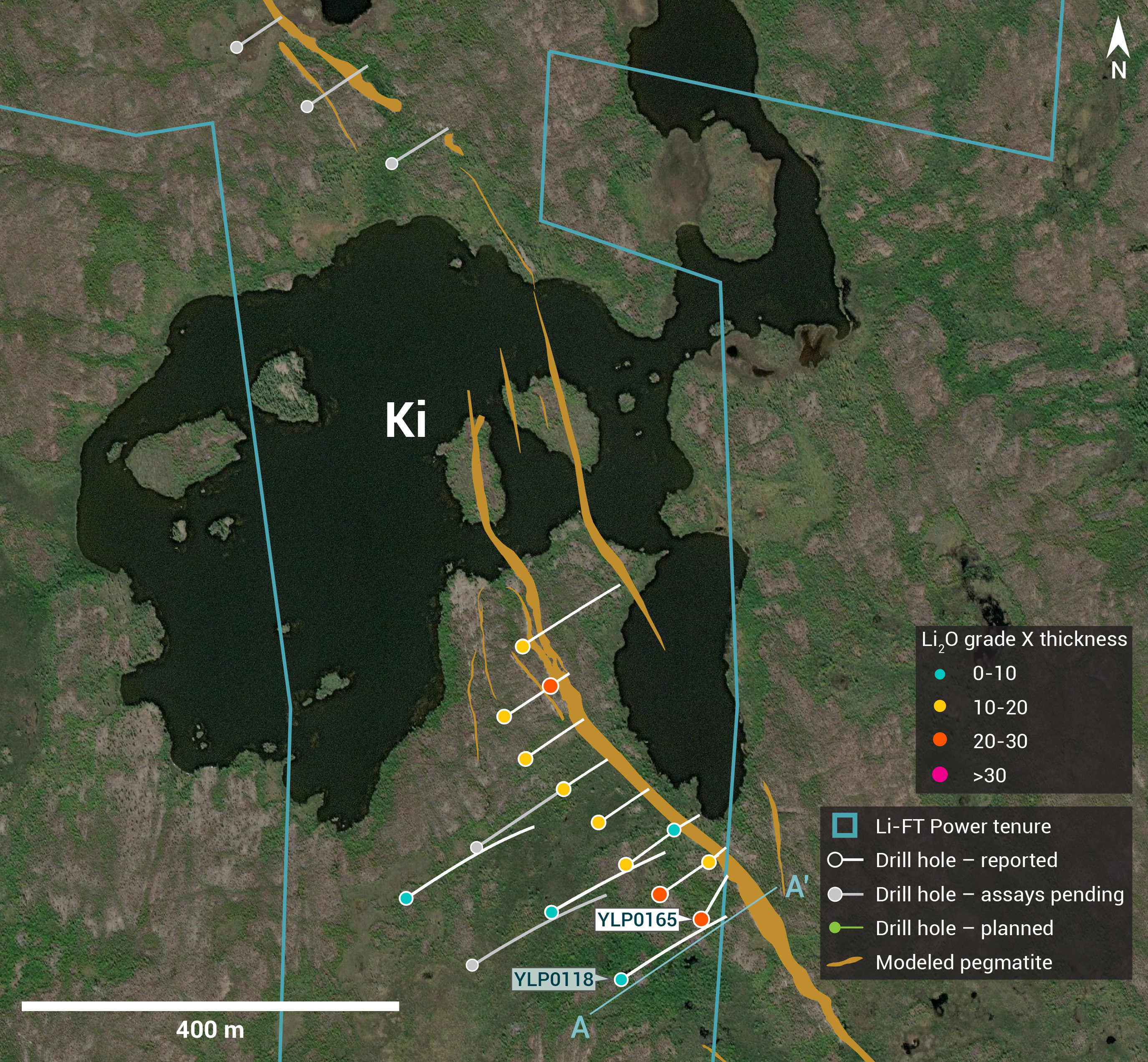
Figure 2 – Plan view showing the surface expression of the Ki pegmatite with diamond drill holes reported in this press release.
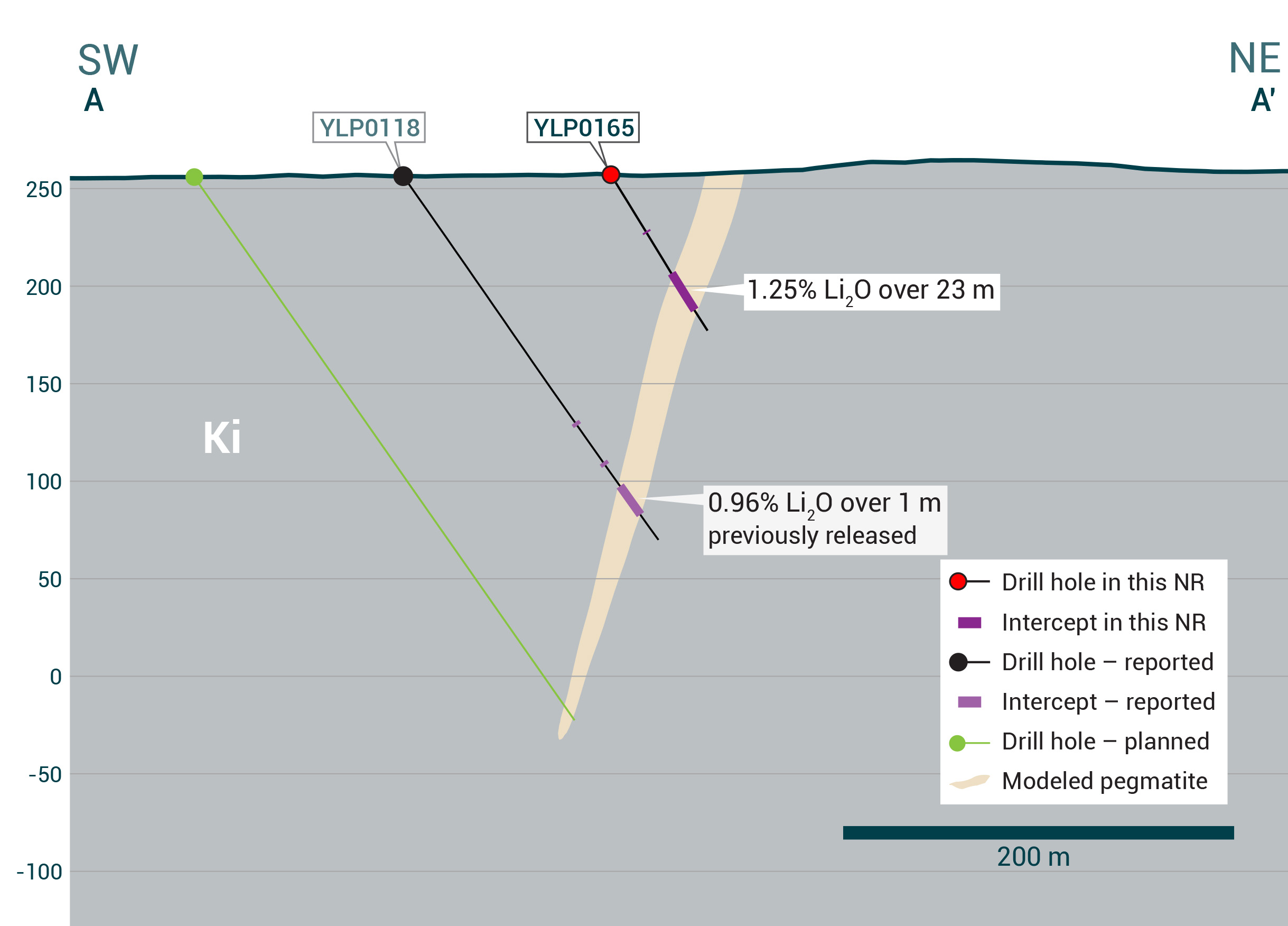
Figure 3 – Cross-section illustrating YLP-0165 with results as shown in the Ki pegmatite dyke with a 23 m interval of 1.25% Li2O.
BIG West Pegmatite
The BIG West pegmatite complex comprises a northeast-trending corridor of parallel-trending dykes that is exposed for at least 1.5 km along strike and is steeply west dipping to subvertical. The complex is bound by two relatively continuous dykes that are 50-100 m apart in the northern half of the corridor and 150 m apart in the south. To facilitate description, these dykes are here referred to as the east bounding (EB) and west bounding (WB) dykes. The holes described below are ordered from southern- to northern-most.
YLP-0163 was drilled ~200 m from the southern mapped extent of the WB dyke and designed to test a pierce point approximately 50 m vertically below the surface. Drilling intersected a single 9 m wide pegmatite dyke that returned 0.99% Li2O over 9 m.
YLP-0158 was collared 50 m north of YLP-0163 to test the WB dyke ~250 m from its southern mapped extent and 50 m beneath the surface. Drilling intersected 16 m of pegmatite that is more-or-less split in half by a 5 m thick panel of country rock. The upper interval returned an assay composite of 1.09% Li2O over 7 m whereas the lower one ran 1.02% Li2O over 9 m.
YLP-0166 was drilled on the same section as YLP-0158 but aimed to intersect the WB dyke at a shallower depth. Drilling intersected a single pegmatite dyke, extending from the base of overburden to 13 m depth, that returned an assay composite of 1.36% Li2O over 9.5 m.
YLP-0150 was collared 50 m north of YLP-0158/0166 to test the WB dyke approximately 300 m from its southern mapped extent and 50 m vertically below the surface. Drilling intersected a single 14 m pegmatite dyke that returned an assay composite of 1.27% Li2O over 13 m.
YLP-0160 was collared 150 m north of YLP-0150 to test the WB dyke approximately 450 m from its southern mapped extent and, again, 50 m vertically beneath the surface. Drilling intersected five pegmatite dykes over a 70 m interval of drill core that each range between 1-6 m in width and sum to 16 m. No significant assays were returned.
YLP-0159 was drilled 600-850 m north of the five holes described above, approximately 300 m from the northern mapped extent of the WB dyke and 50 m below the surface. Drilling intersected four dykes over a 35 m interval of drill core that each range between 1-7 m in width and sum to 14 m of pegmatite. The only notable assays were returned for the second dyke, which ran 0.73% Li2O over 5 m including one meter at 1.48% Li2O (Table 1 & 2, Figures 4, 5 & 6).
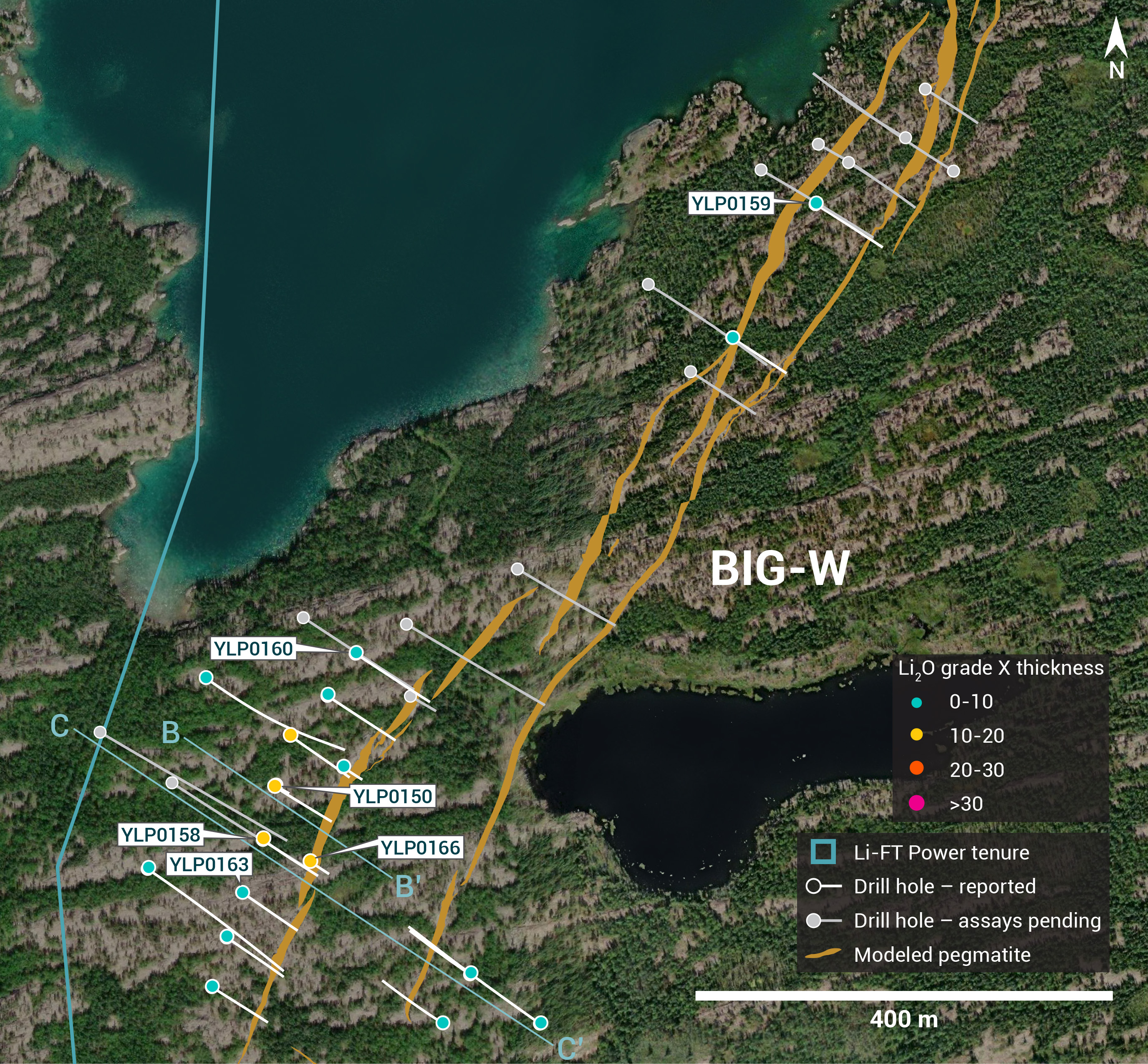
Figure 4 – Plan view showing the surface expression of the BIG West pegmatite with diamond drill holes reported in this press release.
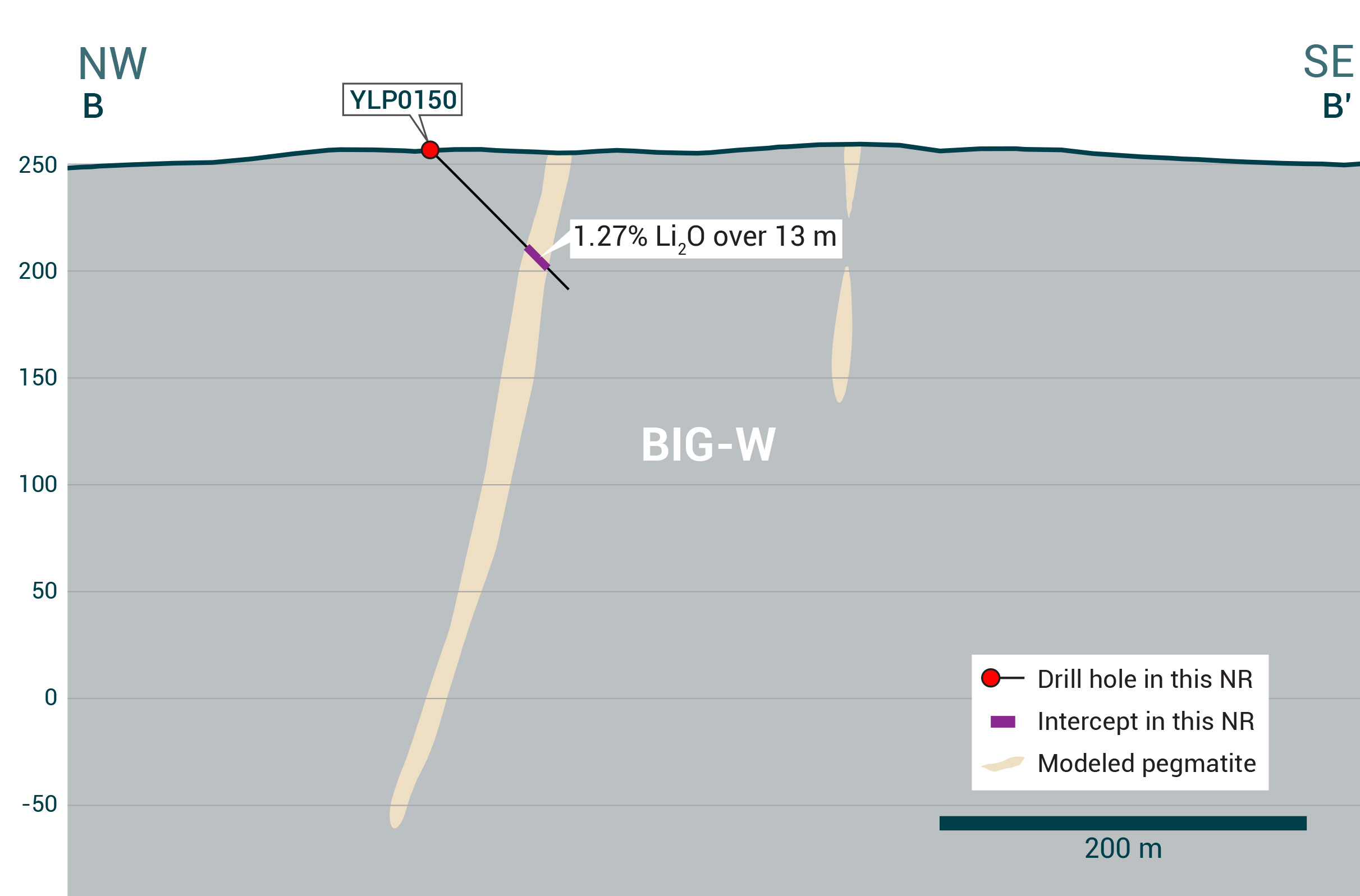
Figure 5 – Cross-section of YLP-0150 which intersected the BIG West pegmatite dyke with a 13 m interval of 1.27% Li2O.
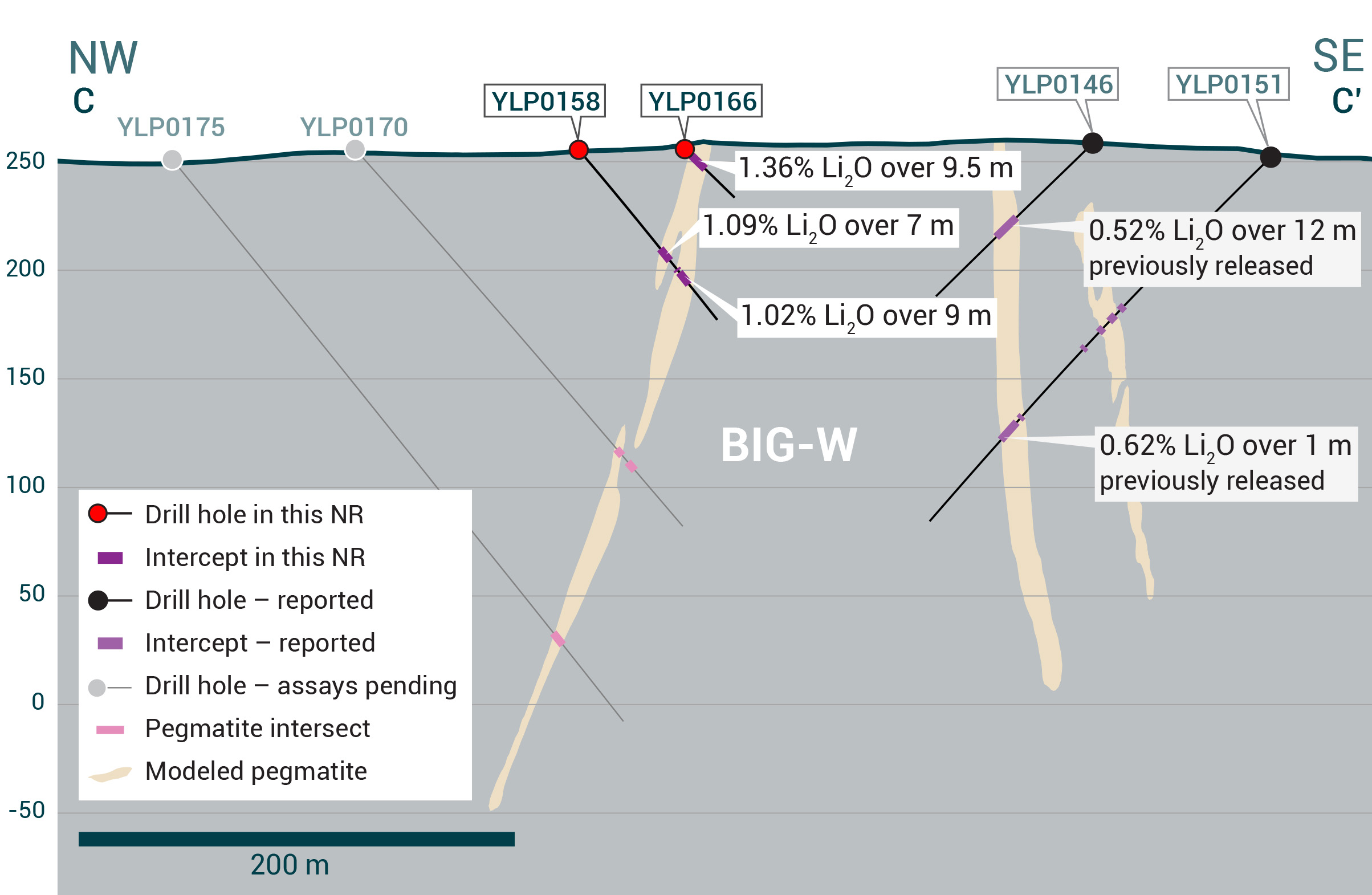
Figure 6 – Cross-section of YLP-0166 which intersected the BIG West pegmatite dyke with a 9.5 m interval of 1.36% Li2O.
Nite Pegmatite
The Nite pegmatite complex comprises a north-northeast trending corridor of parallel-trending dykes that is exposed for at least 1.4 km of strike length, ranges from 10-200 m wide, and dips approximately 50°-70° to the east.
YLP-0157 was designed to test the Nite pegmatite approximately 500 m from its northern mapped extent and 100 m vertically beneath the surface, as well as 50 m downdip of YLP-0149 (1.04% Li2O over 5 m and 0.78% Li2O over 10 m) and 100 m downdip of YLP-0145 (1.28% Li2O over 10 m). Drilling intersected three dykes over a 35 m interval of core, with dykes ranging from 4-9 m in width and summing to 17 m of pegmatite. Assay composites, from upper- to lower-most, include 1.13% Li2O over 1 m, 1.10% Li2O over 9 m and 0.85% Li2O over 2 m (Table 1 & 2, Figure 7).
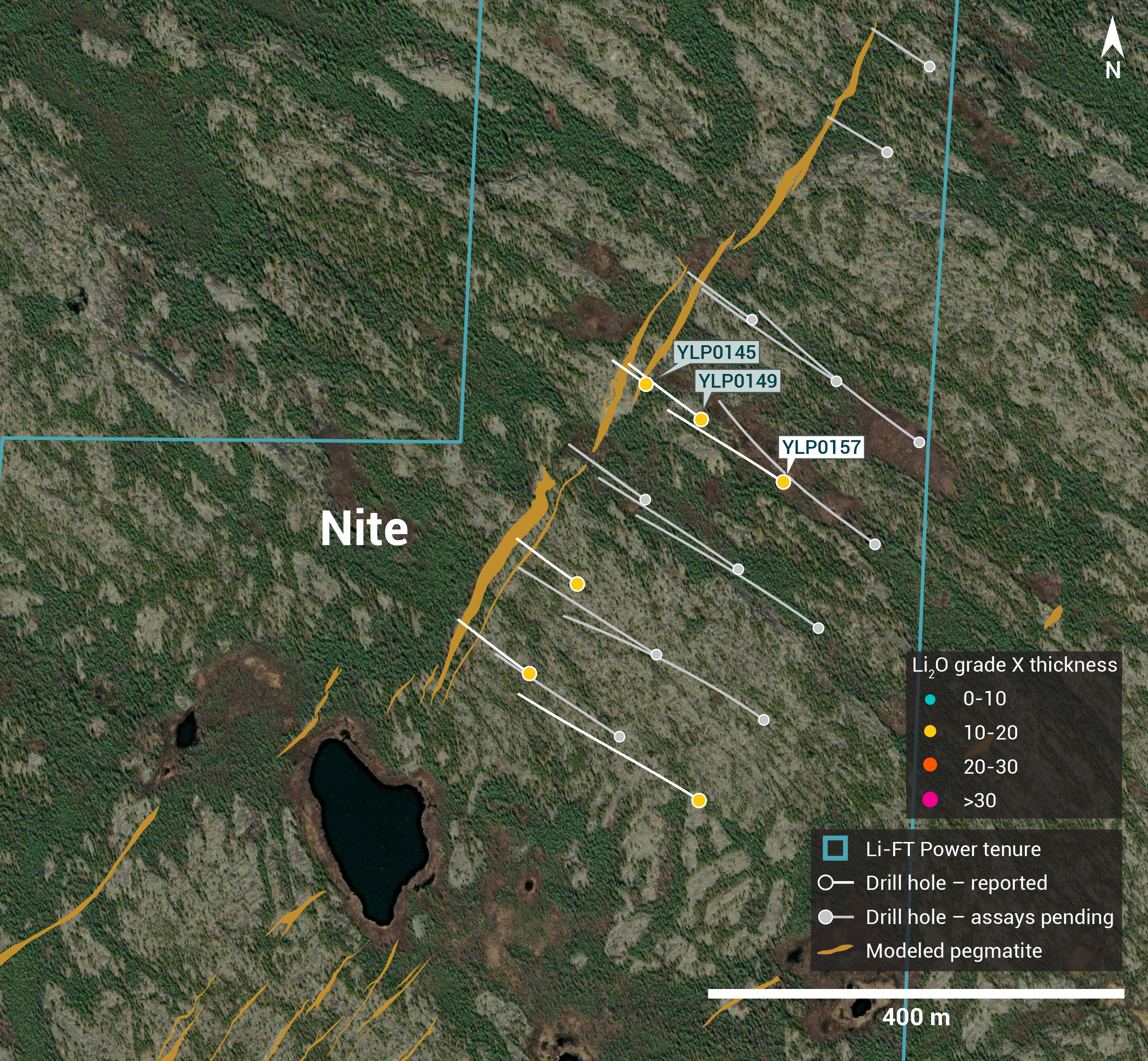
Figure 7 – Plan view showing the surface expression of the Nite pegmatite with diamond drill holes reported in this press release.
Table 1 – Assay highlights for drill holes reported in this press release
| Hole No. | From (m) | To (m) | Interval (m) | Li2O% | Dyke |
| YLP-0150 | 64 | 77 | 13 | 1.27 | BIG West |
| YLP-0157 | 172 | 173 | 1 | 1.13 | Nite |
| and | 183 | 192 | 9 | 1.10 | Nite |
| and | 203 | 205 | 2 | 0.85 | Nite |
| YLP-0158 | 59 | 66 | 7 | 1.09 | BIG West |
| and | 71 | 80 | 9 | 1.02 | BIG West |
| YLP-0159 | 85 | 90 | 5 | 0.73 | BIG West |
| inc | 87 | 88 | 1 | 1.48 | BIG West |
| YLP-0160 | No significant results | BIG West | |||
| YLP-0163 | 69 | 78 | 9 | 0.99 | BIG West |
| YLP-0165 | 61 | 84 | 23 | 1.25 | Ki |
| YLP-0166 | 2 | 11 | 9.5 | 1.36 | BIG West |
Drilling Progress Update
The Company has concluded its 2023 drill program at the Yellowknife Lithium Project with 34,238 m completed. Currently, LIFT has reported results from 164 out of 198 diamond drill holes (28,903 m).
General Statements
All eight holes described in this news release were drilled broadly perpendicular to the dyke orientation so that the true thickness of reported intercepts will range somewhere between 65-100% of the drilled widths. A collar header table is provided below.
Mineralogical characterization for the YLP- pegmatites is in progress through hyperspectral core scanning and X-ray diffraction work. Visual core logging indicates that the predominant host mineral is spodumene.
Table 2 – Drill collars table of reported drill holes in this press release
| Drill Hole | NAD83 | Easting | Northing | Elevation (m) | Azimuth (°) | Dip (°) | Depth (m) | Dyke |
| YLP-0150 | Zone 11 | 653,658 | 6,933,054 | 207 | 118 | 45 | 92 | BIG West |
| YLP-0157 | Zone 11 | 647,675 | 6,936,437 | 206 | 300 | 52 | 222 | Nite |
| YLP-0158 | Zone 11 | 653,651 | 6,933,003 | 205 | 118 | 50 | 101 | BIG West |
| YLP-0159 | Zone 11 | 654,122 | 6,933,659 | 204 | 115 | 45 | 111 | BIG West |
| YLP-0160 | Zone 11 | 653,723 | 6,933,189 | 214 | 118 | 45 | 122 | BIG West |
| YLP-0163 | Zone 11 | 653,636 | 6,932,950 | 209 | 118 | 45 | 95 | BIG West |
| YLP-0165 | Zone 12 | 373,258 | 6,942,597 | 259 | 30 | 56 | 97 | Ki |
| YLP-0166 | Zone 11 | 653,698 | 6,932,986 | 206 | 118 | 45 | 32 | BIG West |
QA/QC & Core Sampling Protocols
All drill core samples were collected under the supervision of LIFT employees and contractors. Drill core was transported from the drill platform to the core processing facility where it was logged, photographed, and split by diamond saw prior to being sampled. Samples were then bagged, and blanks and certified reference materials were inserted at regular intervals. Field duplicates consisting of quarter-cut core samples were also included in the sample runs. Groups of samples were placed in large bags, sealed with numbered tags in order to maintain a chain-of-custody, and transported from LIFT’s core logging facility to ALS Labs (“ALS”) laboratory in Yellowknife, Northwest Territories.
Sample preparation and analytical work for this drill program were carried out by ALS. Samples were prepared for analysis according to ALS method CRU31: individual samples were crushed to 70% passing through 2 mm (10 mesh) screen; a 1,000-gram sub-sample was riffle split (SPL-21) and then pulverized (PUL-32) such that 85% passed through 75 micron (200 mesh) screen. A 0.2-gram sub-sample of the pulverized material was then dissolved in a sodium peroxide solution and analysed for lithium according to ALS method ME-ICP82b. Another 0.2-gram sub-sample of the pulverized material was analysed for 53 elements according to ALS method ME-MS89L. All results passed the QA/QC screening at the lab, all inserted standards and blanks returned results that were within acceptable limits.
Qualified Person
The disclosure in this news release of scientific and technical information regarding LIFT’s mineral properties has been reviewed and approved by Ron Voordouw, Ph.D., P.Geo., Partner, Director Geoscience, Equity Exploration Consultants Ltd., and a Qualified Person as defined by National Instrument 43-101 Standards of Disclosure for Mineral Projects (NI 43-101) and member in good standing with the Northwest Territories and Nunavut Association of Professional Engineers and Geoscientists (NAPEG) (Geologist Registration number: L5245).
About LIFT
LIFT is a mineral exploration company engaged in the acquisition, exploration, and development of lithium pegmatite projects located in Canada. The Company’s flagship project is the Yellowknife Lithium Project located in Northwest Territories, Canada. LIFT also holds three early-stage exploration properties in Quebec, Canada with excellent potential for the discovery of buried lithium pegmatites, as well as the Cali Project in Northwest Territories within the Little Nahanni Pegmatite Group.
For further information, please contact:
Cautionary Statement Regarding Forward-Looking Information
Certain statements included in this press release constitute forward-looking information or statements (collectively, “forward-looking statements”), including those identified by the expressions “anticipate”, “believe”, “plan”, “estimate”, “expect”, “intend”, “may”, “should” and similar expressions to the extent they relate to the Company or its management. The forward-looking statements are not historical facts but reflect current expectations regarding future results or events. This press release contains forward looking statements. These forward-looking statements and information reflect management’s current beliefs and are based on assumptions made by and information currently available to the company with respect to the matter described in this new release.
Forward-looking statements involve risks and uncertainties, which are based on current expectations as of the date of this release and subject to known and unknown risks and uncertainties that could cause actual results to differ materially from those expressed or implied by such statements. Additional information about these assumptions and risks and uncertainties is contained under “Risk Factors and Uncertainties” in the Company’s latest annual information form filed on March 30, 2023, which is available under the Company’s SEDAR+ profile at www.sedarplus.ca, and in other filings that the Company has made and may make with applicable securities authorities in the future. Forward-looking statements contained herein are made only as to the date of this press release and we undertake no obligation to update or revise any forward-looking statements whether as a result of new information, future events or otherwise, except as required by law. We caution investors not to place considerable reliance on the forward-looking statements contained in this press release.
Neither the TSX Venture Exchange nor its Regulation Services Provider (as that term is defined in the policies of the TSX Venture Exchange) accepts responsibility for the adequacy or accuracy of this news release.
Photos accompanying this announcement are available at
https://www.globenewswire.com/NewsRoom/AttachmentNg/9514970e-1330-4855-b7cd-77f1e6ba8aae
https://www.globenewswire.com/NewsRoom/AttachmentNg/5405a9a8-079e-46b6-8e0b-c45f28aed2aa
https://www.globenewswire.com/NewsRoom/AttachmentNg/cd916ec6-d2c4-4bb8-a0fe-285f67ce8c36
https://www.globenewswire.com/NewsRoom/AttachmentNg/0b1cdbe1-bbda-4ace-b1ae-450a93d4ee4e
https://www.globenewswire.com/NewsRoom/AttachmentNg/3031ab39-31bf-430a-8b6e-e8afa3caa8d7
https://www.globenewswire.com/NewsRoom/AttachmentNg/351421e8-1471-4b77-918d-4a280c107cfe
https://www.globenewswire.com/NewsRoom/AttachmentNg/77817c18-35e7-4bed-a66c-a911b8b8bae6

Bay Street News








